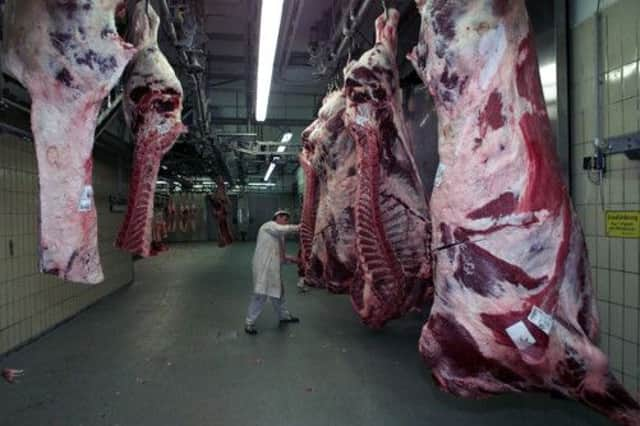Food safety must come ahead of profit


While healthy eating is important, we ought to take a closer look at what’s happening earlier in the food chain.
Plans from the EU, backed by the UK government, are set to weaken meat inspection, opening the door to diseased animals getting into the food chain. As one meat hygiene inspector put it, in a stomach-churning warning: “If you stop looking for it, you stop finding it and you start eating it.”
Advertisement
Hide AdAdvertisement
Hide AdCurrently, symptoms of disease or ill-health in animals, killed for food, are prevented from entering the food chain by meat inspectors, independent of the meat producers. They stop cysts, abscesses and tumours from being processed into food for sale by cutting open animals. If the changes are not stopped by MEPs, the only checks in future will be visual.
A range of unpleasant symptoms of illness in pigs, with sheep and cattle to follow, will be processed into food unchecked and unnoticed. Chickens are not even being visually checked. The European Food Safety Agency has also identified concerns about animal welfare.
The strength of the meat lobby in the EU has already been successful in weakening meat inspection with the introduction of inspectors employed by the companies themselves. We need independent, qualified and skilled officials making these decisions, not the people who work for the meat plants who can be put under pressure to maximise profit and minimise waste for the owners. Consumer confidence requires independent inspection and that needs to be rebuilt after the horsemeat scandal. Supermarkets also have a responsibility to support strong regulation, rather than simply push for cheap food.
Unfortunately, the UK’s Food Standards Agency has “form” for accepting “light touch” regulation. You would have thought after the horsemeat scandal that this would change, but don’t bet on it.
Report
The Scottish Government’s expert advisory group report on the horsemeat scandal recognised the importance of strong sampling and inspection regimes with unannounced visits and stronger sanctions. They said: “Meaningful fines or custodial penalties need to accompany serious food fraud otherwise it will continue to be seen as a relatively risk-free enterprise.”
The report also highlighted the stretched resources of local authorities in enforcing food standards. This is something Unison Scotland identified earlier this year through a survey that showed big cuts in the number of environmental health officers and other enforcement staff. As a consequence the number of food safety samples has dropped from 16,000 to just over 10,000 in the last three years. In addition, the number of meat inspectors has more than halved since 2003.
As one environment health officer put it: “I have spent time with parents whose child has been desperately ill with E.Coli poisoning. It is awful and preventable. We can help prevent this and other tragic things happening. But this will become less and less often. A rise in public health-related illness and injury will happen. But possibly more gradually than most think. Unnoticed maybe. But it will happen.”
Greater control
All of this becomes more relevant as the Scottish Government takes greater control of these matters through the establishment of a new food safety body in Scotland. The Scottish Government must ensure that food safety comes before private profit, but it will be challenging. During the horsemeat scandal, ministers appeared to be more concerned about protecting the Scottish Meat brand. While Scottish Meat is undoubtedly very good, it is also a premium product, out of the reach of low paid consumers. These consumers need regulatory protection for mass market products and I would also argue that Scottish Meat needs this consumer reassurance. It takes many years to build a brand, but just one scandal to destroy it.
Advertisement
Hide AdAdvertisement
Hide AdIndependent officials carry out ante and post mortems on every red meat animal we eat to ensure the consumer does not eat abscesses, tumours, pneumonia, parasitic cysts and a host of other culinary delights. Personally, I prefer it that way! So let’s make sure the new food safety body in Scotland does as well.
• Dave Watson is the head of bargaining and campaigns at Unison Scotland